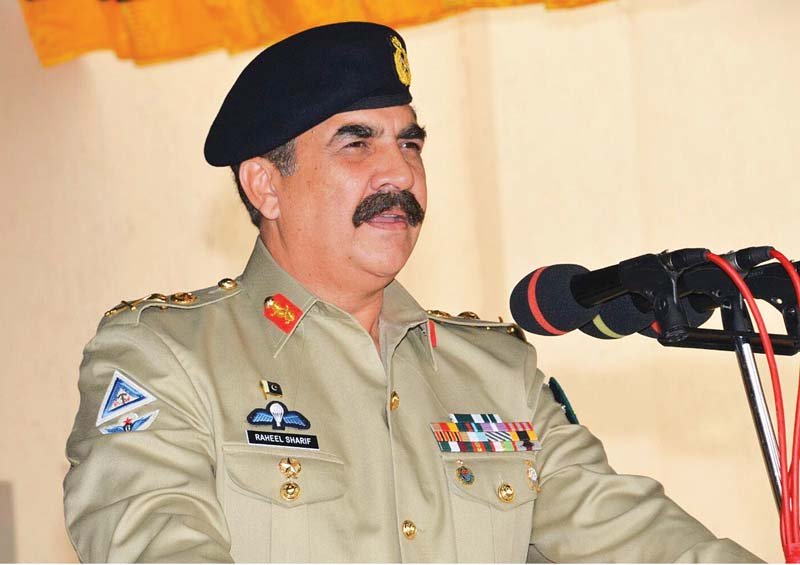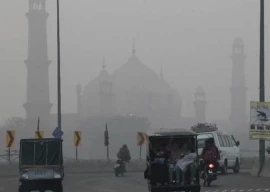
General Raheel Sharif laid to rest speculation on Monday that he would continue to serve as the military chief beyond November 2016 when he is due to retire, insisting he preferred to relinquish the job – unlike two of his predecessors.
“I do not believe in extension and will retire on the due date,” Chief of Army Staff Gen Raheel said in an unprecedented statement.
By declaring his intentions well in advance, Gen Raheel has become the first army chief since 1998 to doff his military uniform after completing his three-year tenure.

His immediate predecessors — Gen Pervez Musharraf and Gen Ashfaq Parvez Kayani — had stayed beyond their mandatory terms.
Gen Musharraf, who had ousted the civilian government in October 1999, remained the army chief from October 1998 to November 2007.
Then his handpicked army chief, Gen Kayani, served for six years after the Pakistan Peoples Party government granted him a three-year extension. In view of the past, speculations were rife that Gen Raheel might also stay beyond November 29, 2016, when his tenure ends.
But the army chief dismissed such speculation as baseless, paving the way for a smooth transition in the country’s most powerful institution.
According to the Inter-Services Public Relations, the military’s media wing, Gen Raheel said: “Pakistan Army is a great institution. Efforts to root out terrorism will continue with full vigour and resolve. Pakistan’s national interest is supreme and will be safeguarded at all costs.”
What is more significant about the statement is that it was issued 10 months before the army chief is due to retire, which appears to be a calculated move by Gen Raheel to avoid unnecessary debate over his future.
He was appointed as the country’s 15th army chief on November 29, 2013. He is scheduled to relinquish his office on November 29 this year.
A senior military official, who is close to Gen Raheel, told The Express Tribune that the army chief had never desired an extension. “[Gen Raheel] believes institutions are more important than individuals.”
The official said the army chief wanted to leave behind a legacy to prove the point that ‘no one is indispensable’.
Gen Raheel, who was picked by Prime Minister Nawaz Sharif to replace Gen Kayani, is known for being a ‘clear-headed general’.
Another insider remarked that the army chief’s ‘clear thinking’ reflected in some of the crucial decisions he has made, such as launching a full-scale military offensive in North Waziristan Agency and supporting the democratic setup despite anti-government protests in August 2014.
When Pakistan Tehreek-e-Insaf Chairman Imran Khan and Pakistan Awami Tehreek chief Tahirul Qadri descended on Islamabad with tens of thousands of supporters to oust the premier, Gen Raheel assured the beleaguered premier that the army had no interest in removing him from power.
“History shows that [Gen Raheel] lived up to his words. This is because of his clear thinking,” said the military official. “And today’s announcement is also testament to the fact that he clearly knows what he has to do.”
Meanwhile, security and defence analyst Brig (retd) Mahmood Shah believes that by putting to rest all rumours, Gen Raheel would now focus on the most pressing issues, such as eliminating all forms of extremism and terrorism.
“In a way he has set a target for himself. This means he has 10 months to finish the job as far as the fight against terrorism is concerned, and it is good for the country.”
For Dr Ishtiaq Ahmed at the Quaid-e-Azam University, however, Gen Raheel’s announcement was surprising. “There is increasing public perception that the army chief is vying for some political role, given the way he is being projected in the social and mass media.”
But the announcement not only quashed that perception but will also “boost the army’s credibility as the most powerful apolitical state institution”, he added.
The decision is also being viewed as a sign of the country’s gradual progress to a strong and sustainable democratic process.
“Pakistan has transitioned beyond the civil-military divide,” said Dr Ishtiaq. “The growing convergence in civil-military interests over national security, democratic process and regional policy augurs well for us.”
Published in The Express Tribune, January 26th, 2016.

1731476617-0/Sandra-Oh-(2)1731476617-0-165x106.webp)















COMMENTS (22)
Comments are moderated and generally will be posted if they are on-topic and not abusive.
For more information, please see our Comments FAQ